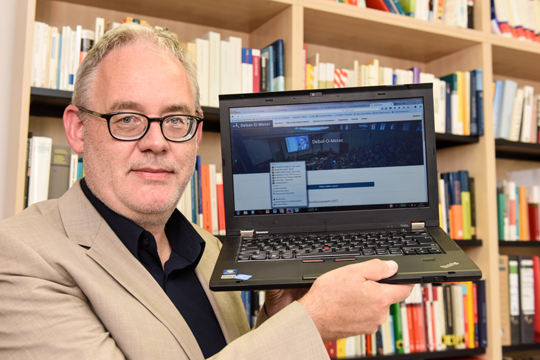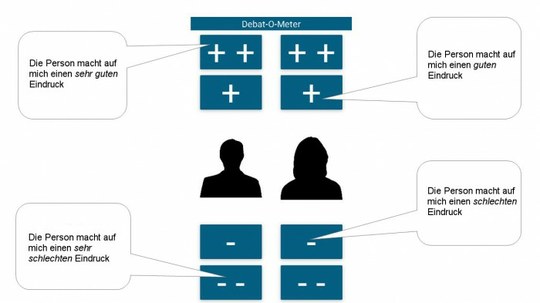Surprise and convince
Freiburg, Sep 27, 2017
Whether it’s a smartphone, tablet or a PC, television viewers can use the debat-o-meter to rate politicians and their arguments live as they discuss the issues on TV. They deliver their evaluations using the keys “double plus,” “plus,” “minus,” and “double minus.” A team working with political scientist Prof. Dr. Uwe Wagschal and computer scientist Prof. Dr. Bernd Becker of the University of Freiburg has developed the app. They’ve also used it to assess debates ahead of the most important German elections in 2017: polls for regional parliaments in Schleswig-Holstein, North Rhine-Westphalia and in Saarland, and the election for the federal parliament, the Bundestag. Nicolas Scherger interviewed Uwe Wagschal about the results.

The debat-o-meter can be a helpful tool in deciding how to vote, says Uwe Wagschal. Photo: Patrick Seeger
Herr Wagschal, how many people have used the debat-o-meter up to now?
Uwe Wagschal: Taken together, a total of 65,000 people took part in the three televised debates that were held in the run up to the election for the Bundestag. For just the duel between German Chancellor Angela Merkel and challenger Martin Schulz alone, more than 40,000 people participated. That was a huge increase in comparison to the polls for the state parliaments. There, the greatest number, 860 participants, joined in for the debates ahead of the vote in Schleswig-Holstein.
Which issues really hit a nerve with the public?
Arguments about refugees and the issue of domestic security received a great deal of approval from some and drew rejection from others. During the televised Merkel-Schulz duel, foreign policy was added, and above all, policy towards Turkey. Pensions were discussed as well, and in the pre-debate survey, people also named that as a key issue, but there were clearly fewer clicks when that topic was discussed.
Which of the politicians’ debating style received positive reactions from the viewers?
With the debat-o-meter, we have a tool with which we can measure communication strategies, but we haven’t analyzed this data has yet. Off the cuff, you could say that the biggest swings came during surprising statements. The most forceful response came when Schulz said that if he were German chancellor, he would end the negotiations for Turkey’s accession to the European Union. That was the evening’s sensation – and one of the few moments, in which he attacked Merkel directly.
So it’s well received when the politicians actually engage in discussion with each other rather than just reacting to questions from debate moderators?
Yes, and in the last debate ahead of the Bundestag elections we began to allow the moderators to be evaluated as well. The public broadcasters of course maintain that their moderators are neutral, but the viewers apparently don’t see it that way. They had the feeling that the politicians on the far left and far right – Sahra Wagenknecht of the Linke (Left Party) and Alexander Gauland of the AfD (Alternative for Germany) – were at a disadvantage because they were frequently interrupted.
You also asked participants which party they preferred and would likely vote for ahead of the debate. Did these preferences tend to determine how they rated the politicians?
We did see that there are real party faithful, troopers, who maintained their loyalty to their favorite throughout. But the majority of the participants were discriminating in evaluating the politicians, meaning they rated some arguments as positive, others as negative. That’s a good sign, because then it’s apparent that we’re not dealing with rigid power considerations and that people really do address the content.

Viewers can use the debat-o-meter to evaluate politicians live during a televised debate. Source: Debat-O-Meter
How representative was the sample of people who took part?
After the federal states, we were fairly ready for the TV debates for the Bundestag election. Nevertheless, we still had above average numbers of men, young people and people with higher levels of education. Politically, the debates in Schleswig-Holstein, North Rhine-Westphalia und the Merkel-Schulz standoff were quite well-balanced, but for the first debate on the federal parliamentary elections we had lots of support for the AfD. In the third, it was tipped towards “Die Linke.” We adjust for factors like this in the statistics by varying the weighting of individuals.
How did viewers behave? Did they economically deliver selective clicks, reserving them for particularly important moments, or did they come rapid-fire, in support of a preferred politician?
Unfortunately, we’re unable to include people who did rapid-fire clicking in the analysis because it would completely distort the statistics. We had 400 participants who did this among the 40,000 viewers who evaluated the Merkel-Schulz duel.
How much importance do you attribute to the TV debates?
More than 16 million people watched the Merkel-Schulz debate on TV. That was the main event of the election campaign, even when it obviously didn’t actually benefit either of them in terms of election results. According to our survey, about eleven percent of the voters said that the televised debates were important for their voting decisions. That’s a relevant amount.
What can the debat-o-meter achieve in this context?
From our standpoint, it’s a tool with which we can contribute to awakening or increasing interest in politics. The novelty is that the participants receive feedback about how they evaluated the politicians with respect to individual groups of issues – something like with the wahl-o-mat. We’re now investigating, among other things, what influence the evaluation during the TV debate had later on voting decisions during the poll.
Join in
The debat -o-meter will be up and running for the televised debate ahead of parliamentary elections in the state of Lower Saxony. The debate will be broadcast on 10 October 2017, starting at 9 p.m. The election will take place on 15 October.
www.debatometer.com

